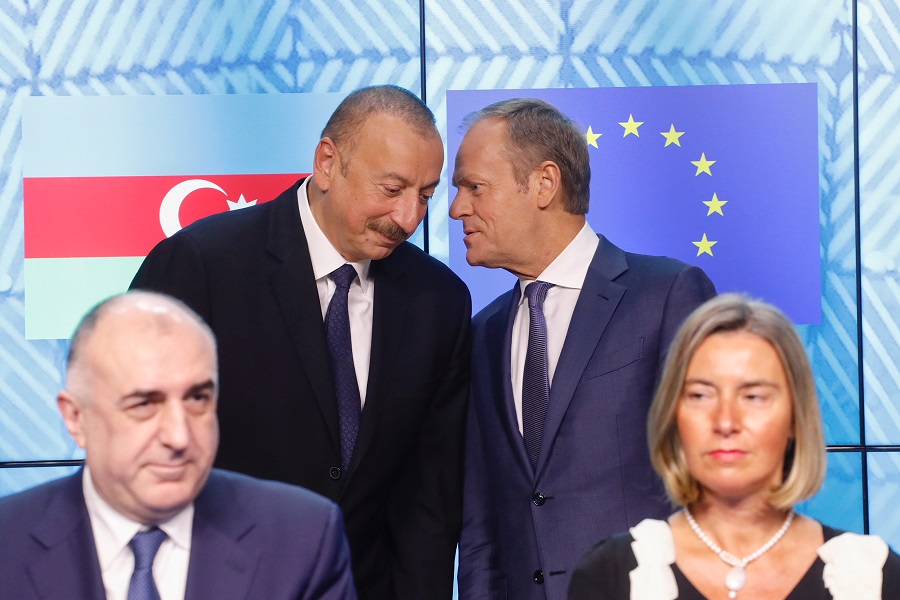Relations between Azerbaijan and the European Union got a boost Wednesday when President Ilham Aliyev met with the president of the European Council, Donald Tusk to conclude negotiations known as EU-Azerbaijan Partnership Priorities.
“Good meeting with @presidentaz Aliyev on the progress in our bilateral relations. Useful discussions on both the domestic situation in Azerbaijan and the regional context,” Tusk tweeted following the meeting in Brussels, which occurred alongside the two-day NATO summit.
“Partnership Priorities” was drawn up at the ministerial level, between the EU’s Federica Mogherini, the High Representative of the European Union for Foreign Affairs and Security Policy; and Azerbaijan’s Foreign Minister Elmar Mammadyarov.
“Together with the ongoing negotiations for a new bilateral agreement, the conclusion of the Partnership Priorities signals a clear intention to enhance the EU-Azerbaijan relationship so as to bring positive results for the benefit of the people of Azerbaijan and the European Union,” read a statement issued by the European External Action Service on Wednesday.
The agreement has been highly anticipated and will cover 2018-2020, aimed at providing sustainable diversification of Azerbaijan’s economy, support for the country’s candidacy to the World Trade Organization, and improving the business and investment environments. The agreement also has a cultural angle, as it mentions support for education and human capital, and providing opportunities for interaction between Azerbaijanis and citizens of EU member states.
The EU will also help Azerbaijan strengthen political and judicial institutions in order to maintain good governance.
Bilateral relations date to 1996, roughly five years after Azerbaijan became an independent country following the collapse of the USSR. That year the two sides signed a Partnership and Cooperation Agreement. In 2001, officials in Baku pushed for closer ties by joining the Council of Europe, and enacted a European Neighborhood Policy.
Energy is a cornerstone to the document signed Wednesday, as it focuses on the Southern Gas Corridor – a 3,500 km pipeline that stretches from the western side of the Caspian Sea to southern Italy, crossing through six countries. The pipeline, which will become fully operational by 2020, will pump over 10 billion cubic meters (bcm) of gas from Azerbaijan’s Shah Deniz natural gas field underneath the Caspian Sea to Europe, while delivering another six bcm to Turkey.
As the EU looks for suppliers to feed the continent’s ever-growing energy needs, Azerbaijan is taking center stage, especially as Europe looks to lessen its dependency on Russia.
“Building on the successful cooperation on energy connectivity and significant progress made on the Southern Gas Corridor, this [agreement] includes support for Azerbaijan’s ability to operate as a trade, logistics and transport hub, regulatory assistance, sustainable management of resources,” reads the statement by the European External Action Service.
Partnership Priorities is a major step in increasing bilateral relations, but it is by no means the end.
Azerbaijan and the EU are planning to draft a new agreement that will replace the 1999 Partnership and Cooperation Agreements, which are broad in scope and also address the political, economic, social and cultural spheres. Trade and investment, human rights, the rule of law, education, energy, transportation and environmental protection are just some the areas covered under such an agreement.







 Armenian sappers commenced on Monday mine-clearance operations in the territories adjacent to the Saint Mary Church in village of Voskepar (Armenia...
Armenian sappers commenced on Monday mine-clearance operations in the territories adjacent to the Saint Mary Church in village of Voskepar (Armenia...
 Iran and Pakistan have signed eight cooperation documents in various fields, and agreed to strengthen ties to fight terrorism in the region.
Iran and Pakistan have signed eight cooperation documents in various fields, and agreed to strengthen ties to fight terrorism in the region.
 President Aliyev emphasized the critical role of the North-South Transport Corridor in fostering transport cooperation between Azerbaijan and Russi...
President Aliyev emphasized the critical role of the North-South Transport Corridor in fostering transport cooperation between Azerbaijan and Russi...



